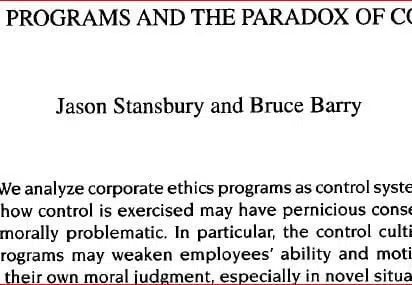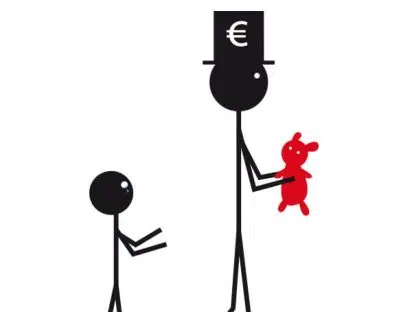This post is based on the Panama papers case – the 11.5 million documents, representing 2.6 terabits of data, from the Panama-based law firm Mossack Fonseca, which were provided by an anonymous source to the Süddeutsche Zeitung over a year ago.
As the French newspaper Le Monde, which participated in its revelation, writes, this is a “tax haven case” (1). The New York Times notes that, according to the documents disclosed, “nearly 215,000 offshore shell companies and 14,153 clients were tied to Mossack Fonseca. They linked 143 politicians, their families and close associates — including 12 highly placed political leaders — to the use of tax havens to shield vast wealth” (2).
In this post, I am not interested in the technical aspects or implications of this case, the developments of which are ongoing (3), but in the way business ethics literature has addressed the moral issues raised by optimisation or evasion strategies, implemented by large companies, especially with the use of tax havens. Among the articles published in the main specialised journals (4), I have selected two of them, published in 2012 and 2014 respectively in the Journal of Business Ethics. They provide a moral analysis of the tax evasion practices of multinational companies. In this post, I am interested in the first one, of which I propose a critical commentary. The other one will be discussed in the next post. After describing the importance of capital flows to offshore financial centres (5) and the various initiatives that emerged in the 1990s to combat tax evasion, Lutz Preuss expressed surprise that the CSR literature has dealt little with the issue (6). To help fill this gap, he proposes, on the one hand, a moral assessment of offshore financial centres and, on the other hand, an empirical study on CSR reporting by a selection of firms headquartered in a tax haven. In particular, the latter study reveals that very few firms mention the tax authorities among the stakeholders to whom they are committed. This result supports Preuss’ conclusion that firms can claim to be socially responsible while practising tax optimisation (7). In his view, it is a perversion of the attitude that a socially responsible company should have towards the law. Because if we adhere to the idea, expressed in particular in the European Commission’s Green Paper published in 2001 (8), then companies should “go beyond common regulatory and conventional requirements, which they would have to respect in any case […].” However, going “beyond common regulatory and conventional requirements” is clearly distorted by tax optimisation practices. The author’s use of the word “duplicity” to describe the position of the firms in question (e.g. “the duplicity inherent in a tax haven-based company professing social responsibility”) is a way of testifying to this misuse. In addition, the mere fact that companies can implement such practices contributes to their perpetuation. Preuss cites an author who refers to the de facto coalition they form with the tax havens whose services they use (9). The power of this coalition also contributes to the perpetuation of the tax optimisation system. If, despite their generality, Preuss’ conclusions are worthy of interest, his article gives rise to some remarks.
The author uses two methods to address the question of whether a company using tax havens can be said to be socially responsible. First, he proposes a normative response before developing an empirical argument, to which I referred above, which is based on a selection of companies domiciled in two offshore financial centres. However, Preuss discusses only one of the two models of CSR he presents at the beginning of his article, i.e. the model according to which a socially responsible firm must “serve a range of stakeholders, including government.” This model is justified by the idea that taxation should not be considered as a cost but as a means of maintaining justice and freedom, which are two of the pillars of market economy. The other model, based on the arguments set forth by Milton Friedman, although presented at the beginning of the article, is not used in the final discussion. It must be said that, in Preuss’ presentation, it is reduced to the idea that economic agents have the right to choose the tax strategy of their choice, as long as they comply with the laws. Preuss could have discussed this model in more detail in his discussion, rather than placing it from the outset on the side of the proponents of aggressive tax optimisation. The second remark concerns the ethical evaluation of companies’ tax strategies. In order to evaluate the practices proposed and induced by tax havens, Preuss refers to three families of normative moral theories, which are very often mobilised: utilitarianism, deontology and virtue ethics. The utilitarian evaluation, which is based on the welfare benefits provided by tax havens for all parties involved, including havens themselves, tends to favour a negative moral evaluation. Market distortions, the shareholders’ ignorance that their company uses tax optimisation, the excessive and dangerous executives’ latitude for financial management, and the fact that many offshore finance centres “have become heavily dependent on financial activities,” are the determining factors in Preuss’ cost-benefit analysis. The deontological evaluation is based on the categorical Kantian imperative in its first version: “Act only according to that maxim whereby you can at the same time will that it should become a universal law.”
Preuss divides it into two test questions: a) Can I imagine without contradiction that the maxim of my action is applied, and b) Would a moral agent like to live in a world in which the maxim of my action would be applied? To question b), Preuss answers in the negative, because it is difficult to imagine a world in which everyone would seek to pay as little tax as possible. With regard to question (a), he underlines the differences in the situation of economic agents and States with regard to the use of tax havens and public policies against their effects on national economies. His conclusion is that the maxim “to use offshore finance centres” is not universalisable. Therefore, it cannot support a moral action. The evaluation, based on virtue ethics, resides in the idea that everyone should constantly cultivate their virtues within their community. Preuss insists that companies that use tax havens do not fully contribute to the communities in which they operate, since they pay a large part of their taxes in another community, in this case a tax haven.
According to Preuss, this is a sufficient reason to make tax optimisation practices immoral from the perspective of virtue ethics. (5) Although Preuss’ three moral evaluations could have been dealt with in more depth, they contribute to ethical reflection. Unfortunately, they are not used in the next section of his article, which deals with the question whether the fact that a business is located in an offshore finance centre “impacts on its CSR strategy and performance.” This results in a rather frustrating and disturbing disconnection, as it leads us to believe that the moral evaluations of the activities of tax havens and of the optimisation strategies of the firms that use them are also disconnected from reality.
Alain Anquetil
(1) “Evasion fiscale : si vous n’avez rien suivi des ‘Panama papers’,” Le Monde, 4 April 2016.
(2) “The’Panama Papers’: Here’s What We Know,” New York Times, 4 April 2016.
(3) See for example “Panama Papers: le Parlement européen ouvre une enquête,” L’Express, 14 April 2016.
(4) To date, less than forty in the Journal of Business Ethics, Business Ethics Quarterly and Business Ethics: A European Review.
(5) See “Pourquoi le ‘New York Times’ (et d’autres médias américains) ont un peu ignoré les ‘Panama papers’,” Le Monde, 5 April 2016, and “Panama Papers: Why No Big Splash or Times Participation?,” (New York Times, 4 April 2016, by the Public Editor, Margaret Sullivan).
(6) L. Preuss, “Responsibility in paradise? The adoption of CSR tools by companies domiciled in tax havens,” Journal of Business Ethics, 110, 2012, p. 1-14.
(7) Unlike tax evasion, tax avoidance is not illegal (see “There's nothing wrong with tax avoidance: we're all forced to do it,” The Telegraph, 18 April 2015). Reading Preuss’s article, we are a little surprised by the use of phrases relating to the tax policy of companies domiciled in tax havens. The expression “tax evasion” appears twice, “tax avoidance” five times, two occurrences being accompanied by the adjective “aggressive” (for example in “aggressive tax avoidance strategies”).
(8) “Promoting a European framework for corporate social responsibility,” to which Preuss refers – but today it is outdated.
(9) “‘Transnational business acted in an informal coalition with tax havens, and their support gave greater weight to the normative arguments made by the havens.” (M. C. Webb, “Defining the boundaries of legitimate state practice: Norms, transnational actors and the OECD’s project on harmful tax competition,” Review of International Political Economy, 11(4), 200, p. 787-827).
(10) Preuss’ analysis would have been more fruitful and complete if he had first sought to identify the moral goods at issue with regard to tax optimization practices. On this point, see R. Hursthouse, “Virtue Theory and Abortion,” Philosophy and Public Affairs, 20(3),1991, p. 223-246.




